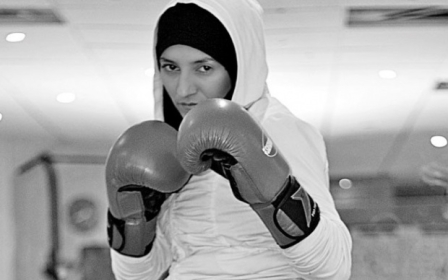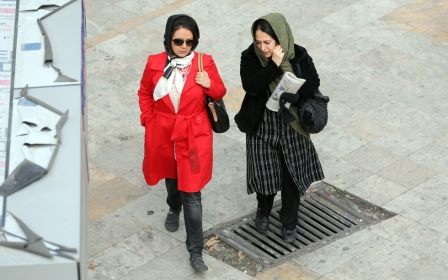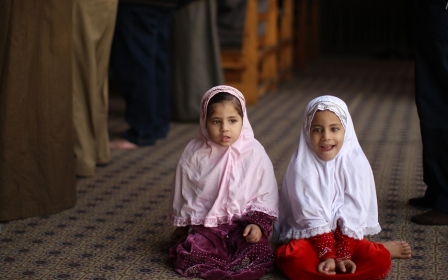Egypt’s upscale spaces ban hijabi women

“They are discriminating based on the criteria of hijab,” Sara said as she narrated her feud with the owners of the La Vista resort in Egypt's northeastern Suez Governorate over the summer.
That summer, Sara wanted to go into the outdoor swimming pool in front of the beach instead of to the women-only covered pool further away, “because I felt like swimming with my family and children”.
However, the guards of La Vista stopped her, claiming that women in "hijabi swimsuits" - those that cover most of the body and hair - were not allowed in this outdoor pool.
“I just want people to know that this is clear discrimination,” said Sara, who did not want to use her last name for fear of stirring up trouble with the managers of her North Coast summer compound.
The guards approached her the day she dived into the pool and told her she was not allowed to enter it with a hijabi swimsuit, and that these rules had been stated “in the contract”. Sara maintained that the contract only stated that a swimming suit had to be one or two pieces and that her diving suit was a two piece suit.
The argument escalated, “and they started becoming more aggressive, yelling, and eventually even cursing”. In a La Vista members Facebook group, Sara wrote that she wanted to take a stand, demanding that hijabi women be allowed to enter any of the compound’s pools. The managers proceeded to remove all of her family members from the group, “except for my uncle’s wife, who had a different last name”.
“After that, they cut the electricity off from us … and only us,” Sara said. “We know it was intentional,” she added - one of her aunts went to ask why the electricity had been cut and was told that the electricity would come back if they “stopped” what they were doing.
After this incident, Sara and a few other girls in the compound went to the pool by the sea and dived in with their hijabi swimming suits.
The act caused people to gather around, “and people began to argue … there were people arguing for and against and the president of the compound came and offered to negotiate.” The incident went viral on the internet, and the managers of the compound offered to buy the villa from Sara’s family.
“They basically just wanted us out,” Sara said, adding that eventually she and her family agreed that they would not put up with the hassle and Sara stopped her protests.
'Clean' vs 'bee'a'
The manager claimed that the rule was for “hygienic purposes,” Sara said. “But this is a silly reason. The swimming suit was the same material as any other swimming suit.” Instead, Sara pointed to the classist tendencies of these expensive resorts and compounds.
“They want to maintain a certain image for the compound, and they see the hijab or the hijabi swimsuit as bee’a,” she said, using an Egyptian colloquial word that pretentiously refers to the working class. “They don’t think it is classy.”
“There is a covered pool for veiled [women], an outdoor pool for veiled women, and a pool that is not for veiled women,” a La Vista employee told Middle East Eye in a phone call to the company’s hotline. She added that because people have different “lifestyles,” the resort “made accommodations that would make everyone comfortable.”
Over the past decade, more and more compounds and resorts are increasingly spreading along the Mediterranean coastline. As these gated communities move further away from Cairo, the compounds become more expensive. Some are seen by Egypt’s elite as “clean,” while others are deemed bee’a.
According to women who have been banned from entrance, these resorts have previously claimed that veiled women were not allowed to enter the swimming pool because there were foreigners present. A hijabi swimsuit is a sight that may drive tourism away, managers have told women that have complained about the discriminatory policy.
“In Stella De Mare in Ain Sokhna, I was in the swimming pool with my family when the security guard came and told me that hijabis are not allowed to enter the swimming pool with two-piece suits. You have to give up on one of the pieces,” Noorhan Amr told MEE.
She went on to say that the guard told her that “'there are foreigners here, and they may not like the sight … These are the rules and you can swim on the beach.' … We got into a fight and never went back there again.”
The trend is not a new one, although interviewees told MEE they believed the phenomenon has increased.
“I was at a hotel called Menaville in Safaga, and I was about to go into the swimming pool and they said the hijabi swimsuit was not allowed. This was six years ago … before the hijab bans even started spreading,” said Nesma El Melligi.
“That day I went to speak to the manager and I tried to understand why there was a ban … each answer was more provocative than the other … the appearance, the foreigners get upset."
The excuses “didn’t make any sense,” El Melligi told MEE.
'No hijabis allowed'
As controversy arose this summer over hijab bans in various upscale resorts, restaurants and even workplaces, a Facebook page entitled “Hijab Racism” was formed. The page took to calling out the places that did not allow veiled women entry.
Some women who voiced opinions in favour of banning hijabis from entering resort pools argued that they would not stand in solidarity with those women until women were also allowed to go to the public beach in Alexandria wearing bikinis.
In several posts, the page demanded the Egyptian Ministry of Tourism take action. Hotel employees often responded that hijabi swimwear was not allowed as it would turn away tourists.
According to the Facebook page, the following resorts do not allow veiled women in their pools: The Farimont Hotel, Steigenberger Hotels and Resorts, Andrea Hacienda, Noria Resort, Royal Maxim Palace Kimpinski and more.
The restaurants and bars that reportedly do not allow veiled women entrance include The Lemon Tree, Cairo Jazz Club, and L’aubergine, which are mostly located in the upscale Zamalek neighbourhood of Cairo.
“One time, my friends and I were in Lemon Tree and Co when it first opened in Zamalek and after we ordered the waiter came and told us, 'I’m sorry but the rules of the place say hijabis are not allowed,'” local resident Dina Adel told MEE.
When MEE contacted the Lemon Tree to inquire about the incident, a spokesperson said: “We’re undergoing a period of renovation for a month and then we will open with a different name ... It will be in the same location, but under a different name so we don’t know yet what the policies will be.”
According to the spokesperson, Lemon Tree did maintain a policy of not allowing veiled women entrance in the afternoon.
“In the morning the place is a restaurant so the veil is allowed but at night it is a bar and there is alcohol so the veil is not allowed,” he said.
While veiled women are not allowed because of the idea that alcohol will be served, women who wear the niqab [face veil] are often not allowed into restaurants even during lunchtime. Nihal Rashed said that the restaurants Sky Lounge in Manial and Carol in 6 October City refused her entry because she was wearing the niqab, “and it was lunchtime”.
Ingy Mohsen, who recently wore the niqab, says no one bothers her on her university campus and she hasn’t been exposed to anything seriously offensive - but there are places where she is denied entry.
“One time we were going to Carcas in Maadi and they told us there was not space when it was obvious the place was empty,” Mohsen said. “We were all in abayas [robes] or niqabs.”
Mohsen added that she had expected she would have to deal with this when she decided to wear the niqab.
The writer of this story is using a pseudonym for security reasons.
New MEE newsletter: Jerusalem Dispatch
Sign up to get the latest insights and analysis on Israel-Palestine, alongside Turkey Unpacked and other MEE newsletters
Middle East Eye delivers independent and unrivalled coverage and analysis of the Middle East, North Africa and beyond. To learn more about republishing this content and the associated fees, please fill out this form. More about MEE can be found here.




